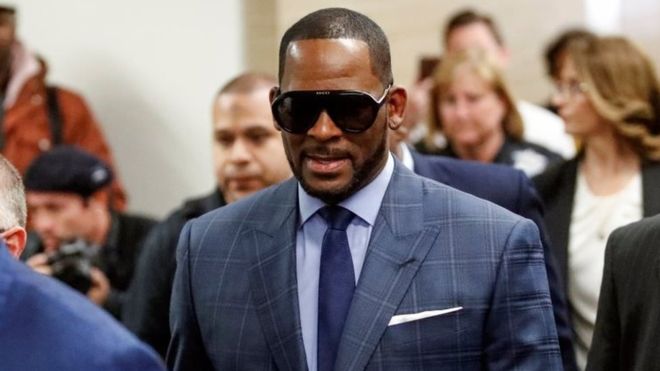R. Kelly is facing prostitution charges by prosecutors in Minnesota, who allege he solicited a teenager who asked him for an autograph in 2001.
According to county attorney Mike Freeman, Kelly invited the 17-year-old to his hotel room and offered her $200 (£164) to undress and dance with him.
After money was exchanged they had sexual contact but not intercourse, Freeman claimed.
Kelly’s lawyer Steve Greenberg said the charges were “beyond absurd”.
His colleague Doug Anton said it was not clear that R. Kelly had ever met his alleged victim and that the charges might be a case of “revisionist history”.
The R&B singer is now facing criminal proceedings in three US states.
The 52-year-old is currently being held without bail awaiting trial on charges of sexual assault, child pornography and obstruction of justice in Chicago and New York.
He has pleaded not guilty to all of the charges.
The singer, whose full name is Robert Sylvester Kelly, has been dogged by allegations of sexual abuse for years.
He previously faced trial on child pornography charges in 2008, but was acquitted when his alleged victim and her parents refused to testify.
Call for witnesses
Since the broadcast of the six-part documentary Surviving R. Kelly in January, several accusers have come forward to press charges.
Cook County State’s Attorney Kim Foxx made a public call for witnesses after watching the series, setting up a tip line in Kelly’s home state of Illinois.
One of the people who called the number was the woman who claims she was assaulted by Kelly in Minnesota 18 years ago.
R. Kelly’s lawyers have characterised his accusers as “disgruntled groupies” and criticised Ms Foxx’s methods.
“When a top law-enforcement figure makes a public cry for the world to come and be famous by telling their sordid story, true or not, it inherently invites people to create revisionist history and put a different label on simple fan-rock star encounters,” said Doug Anton.
At Monday’s news conference in Minneapolis, prosecutor Mike Freeman dismissed these claims.
“Frankly, Minnesota victims deserve their day in court, and that’s one of the reasons we’re here,” he said.
Source: BBC




